Politics
Indians commit highest sexual offences in UK: govt report


LONDON: Indian nationals have emerged as the nationality with the largest percentage increase in convictions for sexual offences in the UK amid a wider surge in foreigners being sentenced for such crimes over the past four years in the country, according to an analysis of official British data by the Centre for Migration Control (CMC).
The think tank, citing UK Ministry of Justice figures, said convictions of Indian nationals rose by 257% between 2021 and 2024, even as overall foreign national convictions for sexual offences grew by 62% during the same period.
The Ministry of Justice (MoJ) data has been drawn from the Police National Computer (PNC).
The CMC analysis showed that sexual offence convictions involving Indians rose from 28 cases in 2021 to 100 in 2024, an increase of 72 cases. Pakistanis are at the bottom of the nationalities for sexual convictions as Nigerians (166% increase), Iraqis (160%), Sudanese (117%) and Afghans (115%) made up the other nationalities with the steepest rises. Bangladeshis and Pakistanis featured in the data with rise of 100% and 47% respectively.
The report also highlighted that Indians ranked third in serious crime convictions, with a 115% increase between 2021 and 2024. The number of such convictions reached 588 in 2024, up from 273 in 2021. “There were almost 75,000 non-summary convictions of foreign nationals between 2021 and 2024… showing a general pattern of increase,” the CMC noted.
The findings come weeks after UK Home Office data showed a sharp rise in Indian nationals held in detention, almost doubling in the past year. Indians also emerged in the data as the second-largest group to receive study visas (98,014) and the largest for work and tourist visas to the UK. Last month, India was included in the expanded list of countries from which foreign offenders will be deported immediately after sentencing, before their appeals are heard.
The nationalities with the highest number of convictions for sexual offences last year were Indians (100), Romanians (92), Poles (83), Pakistanis (56), Afghans (43), Nigerians (40), Sudanese (37), Bangladeshi (34) and Portuguese (33).
The MoJ said the data should be treated with caution. It was possible for an offender to have multiple nationalities listed on the PNC, although they were recorded according to their “first” or “primary” nationality. One individual could also be responsible for multiple offences. Convictions by offenders where there was no declared nationality were excluded from the analysis.
Number of sexual offence convictions by foreign nationals in 2024
According to the data, the number of sex offence convictions for foreign nationals rose by 62%, from 687 in 2021 to 1,114 in 2024, compared with a 39.3% rise for British nationals, from 4,409 to 6,142.
The seven nationalities that accounted for about three quarters of the Channel crossings last year — Afghans, Syrians, Iranians, Vietnamese, Eritreans, Sudanese and Iraqis — saw a 110% increase in the number of sexual offence convictions between 2021 and 2024.
The total number of non-summary convictions of foreign nationals increased by 19.6% between 2021 and 2024, from 17,417 to 20,826. The number of convictions of British nationals increased by 5.9%, from 138,307 to 146,511. That means the number of convictions increased at three times the rate of convictions of Britons.
The nationalities with the highest number of non-summary convictions in 2024 were Romanians (3,271), Albanians (2,150), Poles (1,869), Irish (1,105), Lithuanians (737), Indians (588), Iranians (508), Bulgarians (489), Portuguese (485) and Algerians (472).
A government spokesman said: “Any foreign national who commits these kind of sexual offences in our country will face the full force of the law, and be deported at the earliest opportunity. And thanks to the reforms in our border security bill, any asylum claims they make will also be denied. This Government has already removed almost 5,200 foreign national offenders in its first year in office, a 14% increase on the previous 12 months, and we will continue to crack down on any foreign nationals who come to this country and break our rules.”
Politics
IRGC targets US intelligence centers, military depots in 11th wave of attacks
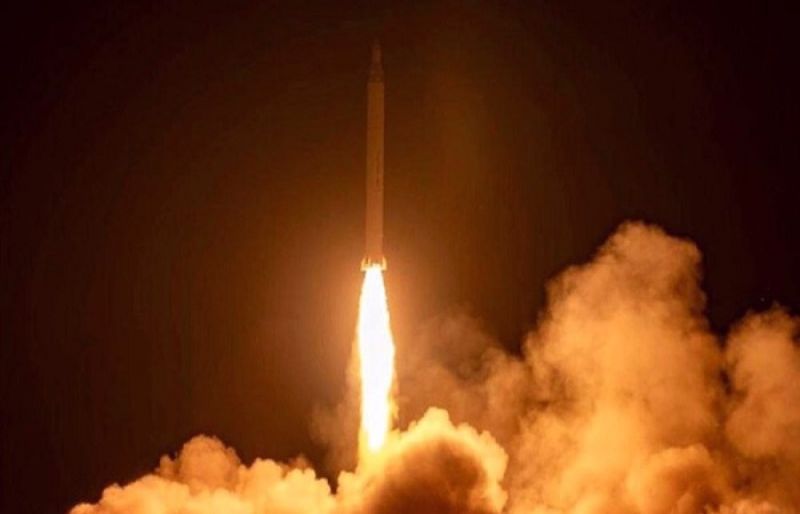

The Iranian armed forces have started a new wave of extensive drone and missile attacks on targets in the Israeli-occupied territories and US assets in regional countries.
A late Monday statement from the Islamic Revolution Guards Corps (IRGC) said that the 11th wave of offensive attacks under Operation True Promise 4 had been launched by the naval and aerospace units of the elite force.
The statement said the “extensive and high-density operation” had targeted American intelligence centers and military support warehouses in the Persian Gulf region, the Israeli communications industries complex in the occupied city of Beersheba, as well as 20 locations in the occupied regions of Tel Aviv, West al-Quds, and Galilee.
It said the “brave sons of Iran’s armed forces” had used more than 700 drones and hundreds of missiles to hit 60 strategic targets and 500 military locations linked to the United States and the Israeli regime since the start of the US-Israeli aggression on Iran on Saturday.
The statement said the number of missiles and drones and the success rate of the attacks had far outpaced records seen during the 12-day war with Israel and the US in June 2025.
The IRGC said recent “brutal and terrorist” attacks on Iran that targeted citizens in hospitals, schools, and offices of the national media service (IRIB) had further strengthened their resolve and determination to pursue an all-out war against the enemies.
The IRGC has been carrying out retaliatory attacks on US military assets across the region and on targets in the Israeli-occupied territories since Saturday, when the US and Israel started the unprovoked war of aggression against Iran and assassinated Leader of the Islamic Revolution Ayatollah Seyyed Ali Khamenei.
Politics
Dubai Airports announces resuming ‘limited’ flights after three-day closure
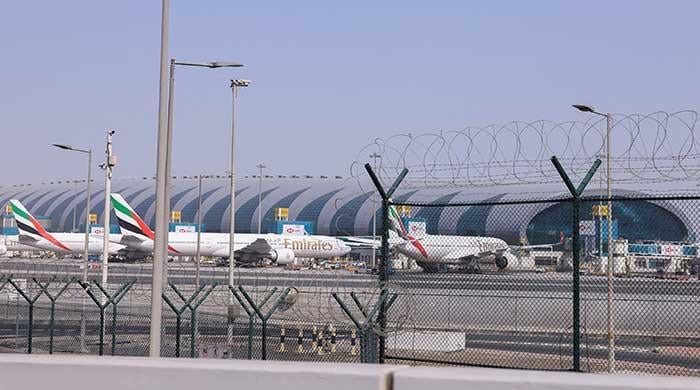
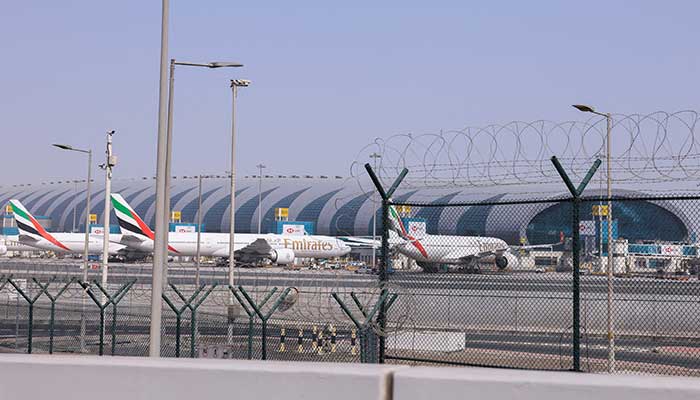
- Emirates, flydubai to restart limited flights from today.
- Etihad Airways announces resuming flights on Tuesday.
- Iran strikes targeted Gulf airports, airspace remains restricted.
Dubai Airports said “limited” flights would resume on Monday evening, three days after they were cancelled as Iran began striking targets in the Gulf, including Dubai and Abu Dhabi airports.
Global air travel remained in severe disarray since Sunday as sustained air strikes forced the closure of major Middle Eastern airports, including Dubai — the world’s busiest international transit hub — in one of the most significant aviation disruptions in recent years.
Transit gateways such as Dubai and Abu Dhabi in the United Arab Emirates, as well as Doha in Qatar, were either shut down or operating under heavy restrictions, with large sections of regional airspace closed.
The disruption followed US and Israeli strikes that reportedly killed Iranian Supreme Leader Ayatollah Ali Khamenei on Saturday, plunging the Gulf into heightened uncertainty.

A fresh wave of attacks extended into a third consecutive day, deepening concerns over regional stability and prolonging the paralysis of air traffic.
“Dubai Airports announces a limited resumption of flights from Dubai International Airport (DXB) and Dubai World Central – Al Maktoum International Airport (DWC) starting this evening, Monday, March 2, 2026,” it said in a statement.
Emirates and low-cost carrier flydubai both said they would resume some flights on Monday evening.
In a post on X, Emirates, one of the UAE’s flag carriers, said it would prioritise passengers with existing bookings. Travellers rebooked on the limited services will be contacted directly by Emirates.
All other flights remain suspended until further notice, the airline said, urging passengers not to travel to the airport unless formally notified. It added that operations will be adjusted in line with developments on the ground.
Eihad Airways, which operates flights from Abu Dhabi, said it would resume flights on Tuesday.
Iran’s unprecedented bombardment in the Gulf states has hit military bases but also civilian infrastructure such as residential buildings, hotels, airports and sea ports, rattling a region long seen as a refuge from Middle East conflict.
Since Iran launched its campaign on Saturday, Dubai, Abu Dhabi, Kuwait and Manama airports were targeted.
Authorities reported one death in the Emirati capital Abu Dhabi in the “incident” at the facility.
On Saturday, the UAE announced it had closed its airspace “temporarily and partially” as an exceptional precautionary measure.
Dubai’s main airport (DXB) ranks as the second-busiest worldwide, behind Atlanta in the United States, according to Airports Council International.
The airspace closures hit a vital sector for the city, with Dubai’s air industry accounting for about a third of the emirate’s economy.
Politics
Jemima Goldsmith convicted in speed limit breach case
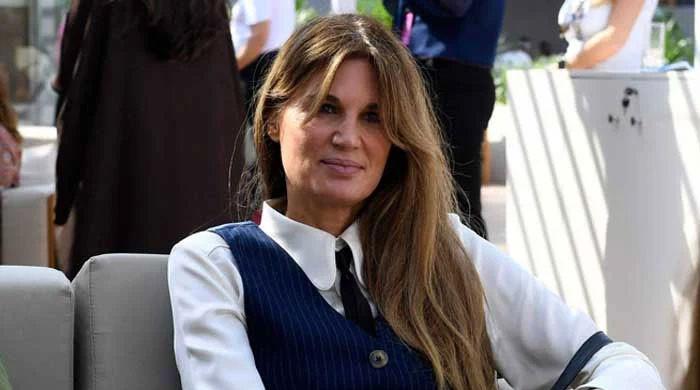
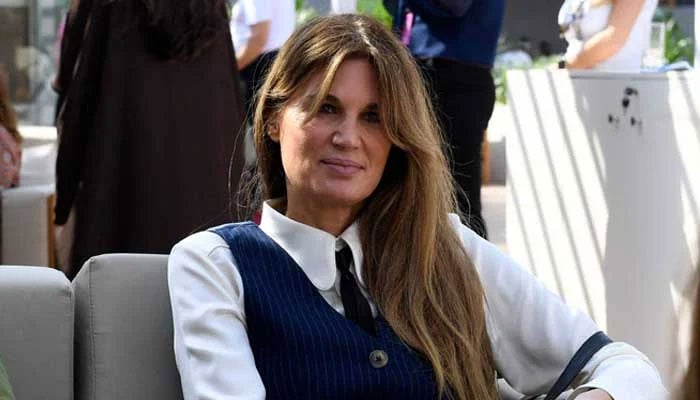
LONDON: TV producer and journalist Jemima Goldsmith blamed her builders as she was convicted and fined £1,000 over a run-in with the Metropolitan Police over a case related to breaking the speed limit.
The 52-year-old, the former wife of PTI founder and leader Imran Khan, failed to respond to police letters after a Mini Clubman vehicle registered in her name was caught breaking the speed limit in north London.
Jemima Goldsmith eventually offered up the name of the guilty driver who had been using her car, but by then she had missed the deadline to respond to avoid court proceedings.
Explaining the blunder, Goldsmith blamed major renovation work on her £10 million Kensington home.
“Due to ongoing construction works at the property where my car is registered, which made access tricky, the original letter was mislaid by builders and I was unaware of its existence until October,” she wrote, in a note to Westminster Magistrates’ Court.
“As soon as it was received, I completed and returned the form immediately.”
Court papers show Goldsmith named a man called Anthony Reilly, who lives in Switzerland, as the person who had been driving the Mini when it was caught doing 46mph on a 40mph stretch of the A1 in Hampstead on August 28 last year.
But her response was dated November 4 – six days after the final police deadline and two months after the first notification of a speeding ticket.
In a letter to the court, Goldsmith also referenced the death of her mother, Lady Annabel Goldsmith, in October last year at the age of 91.
“My PA, who collects the post, had been on annual leave in October and my mother died on the 18th that month, so I was less on top of things than I am normally. I am very sorry for the delay and inconvenience caused. I fully accept that a fine is due.”
Goldsmith was convicted by magistrate Gladys Famoriyo of failing to give information relating to the identification of the driver of a vehicle when required.
The magistrate imposed a £1,000 fine, six penalty points for her licence, and also ordered Goldsmith to pay £130 in costs and a £400 victim surcharge.
Goldsmith, who is known professionally as Jemima Khan, is the founder of a TV production company and has worked as a screenwriter and magazine editor.
She married former cricketer Imran Khan in 1995, and they have two children together.
Documents filed with Kensington and Chelsea Council show Goldsmith successfully applied last year for permission to carry out major renovations on her home, including the demolition and “grand” rebuild of one of the wings of the luxury property.
She was prosecuted over her failure to identify the speeding driver in the Single Justice Procedure, a fast-track court process which spares defendants the need to come to court and allows magistrates to make decisions on convictions and sentences in closed-door hearings.
Goldsmith was among 1,905 defendants who were convicted and sentenced last week for failing to identify the driver of a vehicle when contacted by police.
More than 330 of those defendants lost their licence as a result of the conviction.
-

 Business6 days ago
Business6 days agoHouseholds set for lower energy bills amid price cap shake-up
-
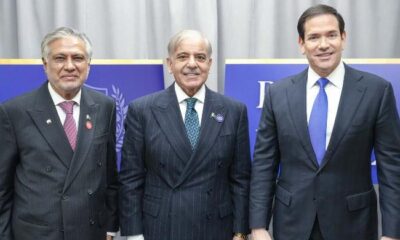
 Entertainment1 week ago
Entertainment1 week agoTalking minerals and megawatts
-

 Business6 days ago
Business6 days agoLucid widely misses earnings expectations, forecasts continued EV growth in 2026
-

 Business1 week ago
Business1 week agoHaryana Govt bars IDFC First Bank, AU Small Finance Bank over alleged Rs 590 crore fraud
-

 Sports7 days ago
Sports7 days agoTop 50 USMNT players of 2026, ranked by club form: USMNT Player Performance Index returns
-

 Sports1 week ago
Sports1 week agoEileen Gu comments on Alysa Liu’s historic gold medal
-

 Entertainment1 week ago
Entertainment1 week agoHailee Steinfeld shares big life update amid excitement for baby’s arrival
-
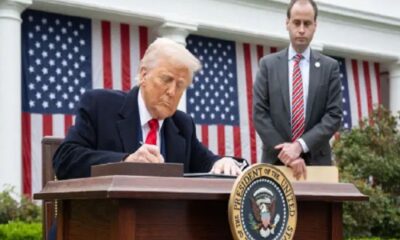
 Politics1 week ago
Politics1 week agoSupreme Court ruling angers Trump: Global tariffs to rise from 10% to 15%






